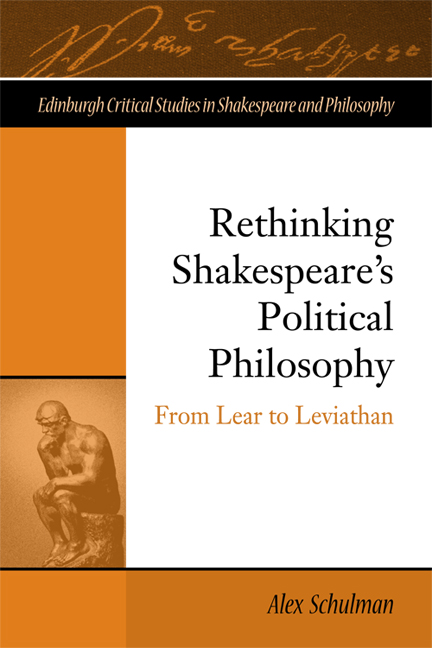Epilogue: Brave New Worlds
Published online by Cambridge University Press: 05 August 2016
Summary
Whereof what's past is prologue, what to come
In yours and my discharge …
The unmasking of erstwhile confessor–Duke as political sovereign that ends Measure for Measureis a useful final signpost for the road this book has, with Shakespeare as mapmaker and companion, travelled. Chapter 5 read Measureas Shakespeare's exploration of the ‘political–theological’ problem in its Reformation context; now, by way of offering some closing thoughts, I will broaden the scope of that unmasking's significance, proposing it as a synecdoche for Shakespearean modernity as a whole.
By 1789, the French revolutionary theorist Sieyès could claim the ‘nation exists prior to everything’ and ‘is the origin of everything … law itself. Prior to the nation and above the nation there is only natural law’. Alexis de Tocqueville, dedicated to explaining the causes and effects of that revolution and its American counterpart, saw the lords and barons of yesteryear fast getting ‘lost in the crowd, and nothing stands out conspicuously but the great and imposing image of the people itself’. Ernest Gellner describes modern politics’ ‘assumption of a moral identity independent of status and occupation … these attributes are supposed to be, and in some measure actually are, redistributed in each generation’. Modern citizens ‘identify, not with hereditary roles, but with the cultural zone (‘nation’) within which roles are redistributable without protest’. Liah Greenfeld calls nationalism ‘a unique form of social consciousness which emerged in the early sixteenth century in England and subsequently spread’, its core ‘social consciousness … a compelling, inclusive image of … a sovereign community of fundamentally equal members’. She calls this consciousness ‘inherently democratic: egalitarianism represents the essential principle of the social organisation it implies, and popular sovereignty its essential political principle’. Of course, contemporary standards for egalitarianism, democracy, and popular sovereignty are quite different than those held by most of the men who (theoretically and practically) initiated this process. Still, the core argument of the ‘social contract’ theorists I placed in conversation with Shakespeare is legible in Greenfeld's terms.
- Type
- Chapter
- Information
- Rethinking Shakespeare's Political PhilosophyFrom Lear to Leviathan, pp. 196 - 200Publisher: Edinburgh University PressPrint publication year: 2014



